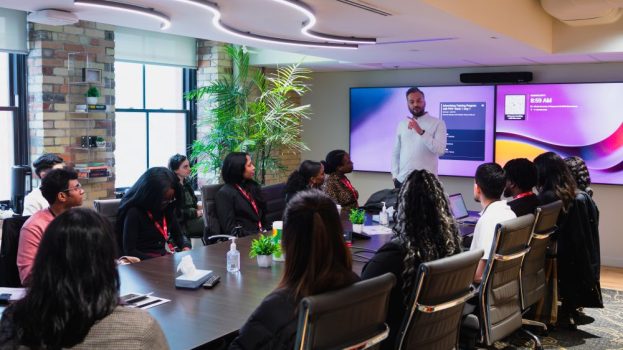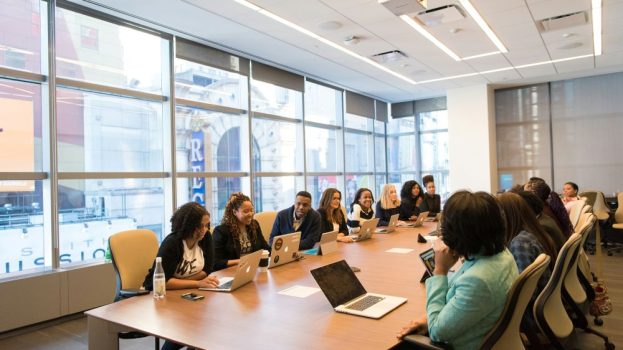 This is the third in a series of profiles on Canada’s commercial production sector – and more specifically, on BIPOC-led companies and organizations that are working to improve diversity and representation in front of and behind the camera. You can also read the first instalment on industry non-profit POV Film and the second on production house Fela.
This is the third in a series of profiles on Canada’s commercial production sector – and more specifically, on BIPOC-led companies and organizations that are working to improve diversity and representation in front of and behind the camera. You can also read the first instalment on industry non-profit POV Film and the second on production house Fela.
In many ways, Imad Elsheikh (pictured, right), the founder and executive producer of Toronto-based production house Pique, is the model of an entrepreneur.
Elsheikh, who started his career on the business side of telecommunications giant Rogers and then moved into a project management role at BlackBerry, always wanted to make his own world, he tells strategy. When he was laid off by the then-smartphone manufacturer, Elsheikh decided he would do just that, setting out on his own and launching the project that would eventually become Pique.
“Before it was a production house, it was just a platform for highlighting artists,” he explains. “I had some ambitious projects in mind, and the first was to highlight 100 different artists in [Toronto]. And that was all kinds of artists: musicians, dancers, painters and so on. I worked with 100 of them, pitched the finished project to Red Bull, and after that, hosted an event. It was successful and brought the artistic community out, which was a big milestone for me. It was also featured on The National, which was another milestone for me.”
That early project showed Elsheikh a path toward what he wanted to do for a living, but it was done on a voluntary basis, which wouldn’t have been sustainable. “I needed to get paid for what I was doing,” he explains. And so, while holding down a day job with Scotiabank, he started seeking out opportunities to do similar work for pay – and found some with the CBC, where he shot artist documentaries in Montreal.
That was almost a decade ago, and Elsheikh has been on a journey with Pique that has seen it grow from a single-person project to a collective of dozens of creative talents working on high-profile projects from music videos to commercial work for Adidas and Canadian outerwear brand Nobis – the latter of which featured prominent brand ambassador Simu Liu. Most recently, the production house worked on an anthemic campaign for Adidas ahead of Canada’s World Cup appearance.
“A lot of the journey has just been figuring out how to operate. It’s hard to open a business, and even harder to keep it open,” he says. “It’s always been hard for me to see where I can grow with a small team, when I should hire more people full-time or work with freelancers. The agency format isn’t easy, either – it can get busy at times, and be slow at other times. Learning how to navigate it all is an ongoing process for me. I didn’t have a lot of benchmarks, and only now do I have some mentors helping me out. I didn’t grow up in the film industry or start out as a PA. I built this on my own.”
Even that has changed, however. Now, Elsheikh is working with mentors in both official and unofficial capacities. Through a program with the Canadian Academy for Film and Television, he has been paired with a Bell Media mentor who has helped him better understand the business. He has also turned to more experienced people for guidance during the COVID-19 pandemic, which created its own challenges – particularly for BIPOC entrepreneurs without as many strong connections in the industry.
Ultimately, he says that what he learned in the pandemic was that success in business is all about making pivots, especially in tumultuous moments.
“Anyone who has been alive longer than I have has said the same thing: Things happen in this world and you have to learn to navigate through it. It’s harder for people our age who are seeing something that’s unprecedented to them, this is their first time, and they’re wondering what they’re supposed to do,” Elsheikh says. “You can plan for the future, but you don’t know what will happen tomorrow. The pandemic could rev up again, or other world situations could come up that will change your entire plan and vision. There’s good and bad in that. There’s good in that you’re ready for anything, but it can frustrate you, because you have to come up with a plan that, at any time, could break.”
For his part, Elsheikh says his primary goal now is just to find new ways to bridge what he has created with the world outside of it.
“I think these days, there’s a lot of following of trends, and it might be better not to be in that state and just kind of make your own wave,” he explains. “I feel like if there are people who want to think that way as well, I’m aligned with them. I do want to see something different than what I see now. It feels like a lot of the same things. If people want to see a different world, they should come and collaborate with us, and we will do likewise.”























